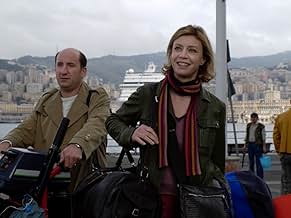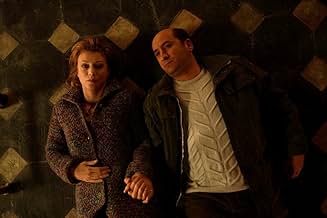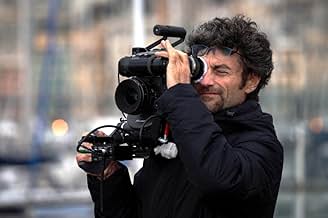NOTE IMDb
6,9/10
3,1 k
MA NOTE
Ajouter une intrigue dans votre langueA well-off and sophisticated couple struggles to stay together after the husband loses his job.A well-off and sophisticated couple struggles to stay together after the husband loses his job.A well-off and sophisticated couple struggles to stay together after the husband loses his job.
- Réalisation
- Scénario
- Casting principal
- Récompenses
- 6 victoires et 35 nominations au total
Avis à la une
Days and Clouds (2007)
Tender, true, and rather moving without being the slightest bit sentimental. This is a look at normal life, in a way, in modern Northern Italy (the setting is Genoa). A fairly comfortable middle aged couple is going through a crisis as one loses a job and the money crunch adds to other everyday stresses.
And that's it. Which is a lot when you realize that that's it. There will be no murder or shocking accidents, no illness or surprise turn of events of any kind, really. Which is why it draws you further and further, gently, with more humor than pathos, until you really believe these people, or these kind of people, exist quite like this. It's not a random slice of life, since there is certainly a core problem being scrutinized (the loss of a job in mid-life, etc.). But in many ways the little events are so "little" in the cinematic sense they are just a small pageant for the viewer.
So what makes it sing beyond the compelling, restrained story is the acting, above all the acting. The couple, the husband and wife facing the crisis, makes sense because the woman (Margherita Buy) and the man (Antonio Albanese) are so perfect at being imperfect. They don't push their crisis too hard, nor do that have the ideal love at the beginning. What they show is the normal troubled tenderness and awkward anger of getting into such a situation.
Besides a second thread following somewhat their daughter's life, which has taken a less materialistic turn then the parents, the movie adds a whole other element throughout--early Renaissance art. The mother happens to have just finished (belatedly) her graduate degree in Italian art from the 1400s. And she is helping restore an obscure small ceiling painting somewhere else in town, seeing it gradually reveal itself as the movie progresses. The reason this matters is it adds an element of beauty and idealism that is implied by the whole rest of the movie. That we (all of us) are not simply here to make ends meet and worry about money. And this something bigger (call it art, call it something spiritual inspired by art or inspiring art) is what holds us up at times.
So by the end the two aspects--the mundane and the ethereal--meld, every so softly. Quite beautiful.
Tender, true, and rather moving without being the slightest bit sentimental. This is a look at normal life, in a way, in modern Northern Italy (the setting is Genoa). A fairly comfortable middle aged couple is going through a crisis as one loses a job and the money crunch adds to other everyday stresses.
And that's it. Which is a lot when you realize that that's it. There will be no murder or shocking accidents, no illness or surprise turn of events of any kind, really. Which is why it draws you further and further, gently, with more humor than pathos, until you really believe these people, or these kind of people, exist quite like this. It's not a random slice of life, since there is certainly a core problem being scrutinized (the loss of a job in mid-life, etc.). But in many ways the little events are so "little" in the cinematic sense they are just a small pageant for the viewer.
So what makes it sing beyond the compelling, restrained story is the acting, above all the acting. The couple, the husband and wife facing the crisis, makes sense because the woman (Margherita Buy) and the man (Antonio Albanese) are so perfect at being imperfect. They don't push their crisis too hard, nor do that have the ideal love at the beginning. What they show is the normal troubled tenderness and awkward anger of getting into such a situation.
Besides a second thread following somewhat their daughter's life, which has taken a less materialistic turn then the parents, the movie adds a whole other element throughout--early Renaissance art. The mother happens to have just finished (belatedly) her graduate degree in Italian art from the 1400s. And she is helping restore an obscure small ceiling painting somewhere else in town, seeing it gradually reveal itself as the movie progresses. The reason this matters is it adds an element of beauty and idealism that is implied by the whole rest of the movie. That we (all of us) are not simply here to make ends meet and worry about money. And this something bigger (call it art, call it something spiritual inspired by art or inspiring art) is what holds us up at times.
So by the end the two aspects--the mundane and the ethereal--meld, every so softly. Quite beautiful.
Giorni e Nuvole is a poignant and deeply human exploration of the fragility of economic security and the resilience of love. Directed by Silvio Soldini (Pane e Tulipani), the film follows Elsa (Margherita Buy) and Michele (Antonio Albanese), a well-off middle-aged couple in Genoa, whose lives unravel after Michele loses his job but hides it from Elsa for months.
The film is not just about job loss-it's about identity, pride, and the shifting power dynamics in a long-term relationship. Elsa, who has just completed her art history degree and quit her job to follow her passion, is suddenly thrust into financial uncertainty. Michele, meanwhile, struggles with his pride and a sense of emasculation in a society where success is still very much tied to male status.
Silvio Soldini masterfully captures the slow, emotional descent of the couple's life: the loss of comforts, the strain on communication, and the raw vulnerability that emerges. The film avoids melodrama, instead relying on subtle performances and realistic dialogue. Margherita Buy delivers a particularly nuanced performance-Elsa is dignified yet visibly unraveling. Antonio Albanese's portrayal of Michele is restrained but powerful, evoking sympathy even when his character makes frustrating choices.
Cinematographically, the film leans into cold blues and grays, reflecting the mood of uncertainty and loss. The pacing is deliberate, mirroring how life's biggest changes often come not as explosions, but as a slow crumbling.
The film is not just about job loss-it's about identity, pride, and the shifting power dynamics in a long-term relationship. Elsa, who has just completed her art history degree and quit her job to follow her passion, is suddenly thrust into financial uncertainty. Michele, meanwhile, struggles with his pride and a sense of emasculation in a society where success is still very much tied to male status.
Silvio Soldini masterfully captures the slow, emotional descent of the couple's life: the loss of comforts, the strain on communication, and the raw vulnerability that emerges. The film avoids melodrama, instead relying on subtle performances and realistic dialogue. Margherita Buy delivers a particularly nuanced performance-Elsa is dignified yet visibly unraveling. Antonio Albanese's portrayal of Michele is restrained but powerful, evoking sympathy even when his character makes frustrating choices.
Cinematographically, the film leans into cold blues and grays, reflecting the mood of uncertainty and loss. The pacing is deliberate, mirroring how life's biggest changes often come not as explosions, but as a slow crumbling.
This is a cautionary tale of an upper middle class couple whose life is going down the toilet. The husband Michelle has been forced out of his successful business by his partners but keeps the secret from his wife. Unaware, she continues to work with passion toward her degree in art. He throws an extravagant surprise birthday party for her, and this will be the last day of happiness for both of them.
He drops the bombshell the next morning: I haven't worked for two months, we need to sell cancel our vacation to Asia, let go of the maid, sell our sailboat, and move to a smaller and more affordable place.
Like a dinosaur unable to deal with a climate change, the husband pretends with friends and his daughter that everything is fine. He passes up an opportunity for a meaningful but lower paying management position and sinks into depression as he is forced to accept entry level and temporary jobs. Meanwhile, his wife is trying her best to make this miserable situation work.
A strong but relentlessly grim movie to watch as the couples lives crumble around them. The beautiful city of Genoa has never looked worse as we are immersed in back alleys and scenes of industrial sprawl.
He drops the bombshell the next morning: I haven't worked for two months, we need to sell cancel our vacation to Asia, let go of the maid, sell our sailboat, and move to a smaller and more affordable place.
Like a dinosaur unable to deal with a climate change, the husband pretends with friends and his daughter that everything is fine. He passes up an opportunity for a meaningful but lower paying management position and sinks into depression as he is forced to accept entry level and temporary jobs. Meanwhile, his wife is trying her best to make this miserable situation work.
A strong but relentlessly grim movie to watch as the couples lives crumble around them. The beautiful city of Genoa has never looked worse as we are immersed in back alleys and scenes of industrial sprawl.
10enamcaty
*Days and Clouds* (2007) is an Italian drama film directed by Silvio Soldini. It follows Elsa and Michele, a wealthy middle-aged couple whose comfortable life shatters when Michele loses his job. Elsa, an art historian, is forced to take small jobs while Michele struggles with pride and despair. Their once-loving relationship strains under financial stress, leading to personal transformation and a reassessment of their priorities. The film explores themes of economic instability, resilience, and love in adversity, portraying a realistic and emotional journey of adaptation and rediscovery.woww!
A great follow up to Bread and Tulips, this story focuses on the other end of the spectrum of a relationship. As the movie progresses and the situation of the characters worsens, you begin to see subtle changes in the manner the couple interacts with each other, kudos to the fine actors for portraying such intimate and fragile emotions so realistically.
Does love conquer all? Silvio Soldini (who was present after the world premiere of this in Toronto to comment on this question) isn't sure if it does, but he's hopeful. Decide for yourself and watch this film as he takes you on a journey of the highs and lows of a middle-aged relationship.
Does love conquer all? Silvio Soldini (who was present after the world premiere of this in Toronto to comment on this question) isn't sure if it does, but he's hopeful. Decide for yourself and watch this film as he takes you on a journey of the highs and lows of a middle-aged relationship.
Le saviez-vous
- AnecdotesOrietta Notari's debut.
- Bandes originalesSono Tremendo
Written by Giosy Capuano (as G.Capuano), Mario Capuano (as M.Capuano) and Danilo Ciotti (as A.D.Ciotti)
© Edizioni Chappell, S.r.l. / Fonit Cetra Music Publishing, S.r.l.
Performed by Pivio & Tuscolano Brothers
Courtesy of Warner-Chappell Music (Italiana), S.r.l.
Meilleurs choix
Connectez-vous pour évaluer et suivre la liste de favoris afin de recevoir des recommandations personnalisées
Détails
Box-office
- Budget
- 300 000 € (estimé)
- Montant brut aux États-Unis et au Canada
- 112 102 $US
- Week-end de sortie aux États-Unis et au Canada
- 16 707 $US
- 13 juil. 2008
- Montant brut mondial
- 6 966 224 $US
- Durée1 heure 58 minutes
- Couleur
- Mixage
- Rapport de forme
- 1.85 : 1
Contribuer à cette page
Suggérer une modification ou ajouter du contenu manquant
















